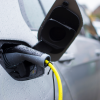In recent years, vehicles have been getting increasingly bigger – however, an industry leader has suggested that this could be reversed by the growing success of EVs.
Jerome Micheron, Senior Vice President of Peugeot Product, spoke to The Telegraph about the future of the industry.
He said that cars could get smaller as EVs do not require bulky internal combustion engines (ICEs) and that the batteries used in these vehicles would get smaller as technology advances.
“In general, the architecture of electric cars fully optimises the interior space for the given exterior size of the vehicle, such as the distribution of the car's proportions between the engine/motor compartment, the passenger space, and the luggage space, versus that of a dedicated ICE vehicle,” said Micheron:
The challenge will be for manufacturers to reduce the size of the vehicle, while being able to offer more range and in-vehicle capacity.
Prof David Bailey, of the Birmingham Business School, agreed with this. He also spoke to The Telegraph about what the future holds for EVs.
He said: “There is particular scope for downsizing sports utility vehicles or crossovers given that this segment has driven a recent growth in car size.
“There isn’t the need to accommodate a bulky internal combustion engine and space can be configured for maximum effect, with the possibility to decrease the overall size of the car."
Future for EVs in Britain
With electric vehicles potentially getting smaller, what impact will this have on the wider adoption across Britain – especially with the 2030 deadline less than seven years away.
In October 2022, the Government confirmed that the planned ban of the sale of new petrol and diesel vehicles from 2030 will go ahead.
The Department for Transport (DfT) released a statement following the Government’s announcement where they set out its goals for 22% of manufacturers' new car sales to be zero emission vehicles (ZEVs) in 2024.
What makes this important for the future of the industry, is that these are legally binding targets.
The aim for this is for sales of EVs to rise to more than 33% in 2026, 52% in 2028, and 80% in 2030.
However, recent Society of Motor Manufacturers and Traders (SMMT) data showed that March 2023 saw the biggest uptake in battery electric vehicle (BEV) in history – showing the growing trend of Brits making the switch.
In their most recent report, they stated: “Petrol-powered vehicles remained the most popular fuel type, comprising 56.3% of new units, while BEV deliveries reached a record monthly high of 46,626, representing growth of 18.6%.
“Overall, the BEV market share remained almost the same as last year at 16.2% and, with plug-in hybrid (PHEV) registrations growing by 11.8%, plug-in registrations comprised 22.4% of the market – a slight decline in 2022.
“The biggest growth, however, was in hybrids (HEVs), with a 34.3% surge helping electrified vehicles account for more than one in three registrations for the month.”
However, it isn’t all good news for the industry – as it has been plagued with parts shortages and wider societal issues in recent years which has slowed the industry’s growth.
The report concluded: “Models are coming to market in greater numbers, but consumers will only make the switch if they have the confidence they can charge whenever and wherever they need. Success of the mandate, therefore, will be dependent not just on product availability but on infrastructure providers investing in the public charging network across the UK.”
Will you be looking to make the switch to electric for your next vehicle? Or do you have concerns about the industry which is putting you off buying an EV? Leave your comments below.

RAC sale – up to 33% off*
• Roadside cover from £5.29 a month†
• We get to most breakdowns in 60 mins or less
• Our patrols fix 4/5 breakdowns on the spot











